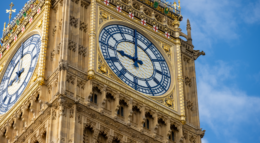
Tony Blair does not know how to argue logically
Tony Blair and his cronies have lost all sense of logic and reason since the Referendum, relying on baseless feelings, writes Bruce Newsome
Tony Blair is back, and his arguments are as stupid as ever. Not content for his protégé Lord Adonis to take the dishonour last week as barmiest Brexit-basher yet (Adonis blamed Brexit for his resignation from a minor advisory position on railways), Blair took the title this week, with a vengeance.
Blair's new "campaign" against Brexit reprises all the abuses of evidence and logic, all the sanctimony and pathos, that made him a champion of the emotive and pseudo-intellectual classes.
Blair is not an evidence-based arguer. After some typically breathless, warbling appearances on radio and television this week, his most substantive expression of his "campaign" is a new "article" or "report" – entitled "What We Now Know", published on the website of his Institute for Global Change. His "commentary" to "What We Now Know" doesn't review what we know, it reviews what he feels. He tells us of his "desire" that Britain should stay in the EU, that he "passionately believes" that "we are making an error."
Blair betrays no attempt to argue logically; in any case, he is deceptively contradictory. He writes that he doesn't want "to reverse" the Brexit vote, and that "no one disputes it," but he wants "the right to change our minds" and to be "permitted to mutate our perception."
That's it – that's his commentary on "What We Now Know". What we now know is what we always knew: he has passions and desires that contradict a popular vote, he wants everybody to trust his passions and desires rather than their own, and to pretend that nobody is overturning a popular vote – that they're just asserting their "rights."
Just to be clear what Blair is doing here: he is contradicting his own argument; then he hides his contradiction with double-speak, by pretending that a reversal of the referendum is not a reversal, it's just a change of mind.
Incidentally, he conflates the term "right" in order to tap again on the knee jerk reflex of the emotive and pseudo-intellectual classes, to imply that if one doesn't change one's mind, then one is not exercising one's rights, and that if anyone opposes a reversal of the referendum, then that person is taking away our rights! George Orwell would have been delighted to have dreamt up such double-speak and conflations for 1984.
Blair's "commentary" offers no data, but leads to an executive summary, which is merely a list of data, none of which is used in an argument. Let me remind the pseudo-intellectuals at the Institute for Global Change: data are not evidence, unless they are proposed to prove something.
The Institute's data don't prove anything. They are just observations, left hanging, stranded, out of context, and without any propositions. The Institute infers that bad things are caused by Brexit, but without admitting that the referendum had nothing to do with them – or little compared to other causes. For instance, the executive summary states that food prices are growing at their fastest rate in 4 years, which actually has been a trend for decades, caused by over-population and climate change, and has nothing to do with Brexit. Similarly, the Institute states that applications from EU nurses to work in the NHS have fallen, but fails to mention that the NHS has belatedly raised its standards for English-language literacy and criminal background checks.
Blair's Institute sources data without care to the biases of the observers behind the observations, such as the Centre for Economic Performance, which claimed that the referendum had cost the average household £404 per year already. Some of the sources used by the Institute are reports in The Guardian, placed by people who work at the Institute.
The rest of the so-called "report" continues on the same webpage – a tiresome series of headings above cursory sentences giving stranded and biased data. For instance, under the heading "Business Opinion" is the claim that "only 2% of British businesses think the Government is right to leave the single market and customs union" – but the source is the British Chambers of Commerce, which over-represents the service sectors that benefit from cheap migrant labour, and whose leadership is politicized. Let's not forget that this is the same organization that suspended its Director-General for saying that Britain would be better off outside the EU. Of course, a survey by the British Chambers of Commerce should be included in any review of what British businesspeople think, but only if balanced by other surveys from other business representatives. The observation of 2% could be used as evidence, but only if corroborated by other surveys from other sources. The webpage doesn't give any other British business sources -it goes on to tell us what "foreign businesses" think of us!
Blair's argument is an abuse of logic and evidence. At best, it's an argument of pathos – an argument that relies on emotion. He has been relying on his "passionate beliefs" since at least 1995. He succeeded politically in an era when emotion became more fashionable than facts – a shift that Blair and his New Labour spin-doctors constructed as liberal enlightenment.
Unfortunately, more than twenty years since he became prime minister, Blair's norms are still at the centre of public discourse. They persist whenever the current Labourites and Liberal Democrats say that they are upset by the plights of the poor or EU migrants who choose to work away from their families. Aren't we all? Just because we are upset doesn't mean we should give up our capacity for arguing logically and empirically.
The trouble with a reliance on pathos is reductionism and emotiveness. Pathos gains personal, social, or political satisfaction by drawing attention to emotional awareness, at the expense of evidence and logic. Reductionists and emotives encourage policies that demand reaction rather than deliberation, treatment rather than prevention, relief rather than solution. Reductionists and emotives give us policies that treat poverty as the responsibility of everybody except the poor, that treat everybody who claims to be a refugee as a refugee, that commit a set proportion of our wealth as international aid to the corrupt governments and warlords who create those refugees, and that defer to the European Union rather than be accused of unilateralism or nationalism.
Then, when a majority rejects the reductionism and emotiveness, given an opportunity to deliberate the facts logically, the reductionists and emotives turn around and tell the majority to change their mind, because they didn't know the "facts" (as Green Party leader Caroline Lucas claimed) or that they were too "uneducated" to understand the facts (as Labour MP Barry Sheerman claimed).
Nothing is more abusive of the facts or as uneducated as the Blairite style of argument. If Brexit-bashers want to win a second referendum, they'd better discover how to argue logically and empirically. But, as proved this week, Blair won't be one of them.















